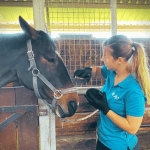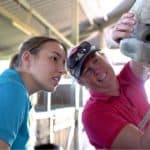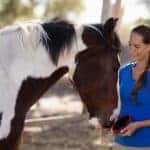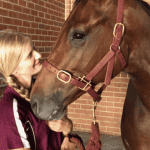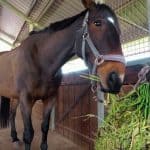Deciding what to feed, how often and how much to feed your horse can seem fairly complicated. Nutrition is an important factor in your horse’s overall health and getting their diet right can help ensure a happy, healthy horse. There are many different sciences, opinions and calculations available to help you formulate the most appropriate ration for your horse.
Factors that impact nutritional requirements
The nutritional requirements of horses vary according to individual needs and are determined by such factors as:
- age and growth
- size
- work load/type
- condition and health status
- temperament
- how your horse is housed
- pregnancy and lactation
- weather.
While each horse is individual in their requirements, there are 12 golden rules when it comes to feeding all horses. These are explained below:
The 12 Golden Rules of Feeding Horses
1. Feed little and often
Compared with other animals, horses have the smallest stomach relative to body size, and it can only hold a limited amount of food at any one time. Horses are often described as ‘trickle feeders’ – this means that their digestive system is designed to cope with small amounts of food on an almost constant basis. Common practice, for a horse not in a paddock, is to feed three times daily – breakfast, lunch and dinner.
2. Feed a well-balanced diet
Ensure the horse is receiving all the essential nutrients from its rations. This includes roughage, proteins, concentrates, minerals and vitamins. There are many vitamins and minerals that are considered essential for a horse’s development and they cannot obtain these all naturally, particularly stabled horses or those in high-performance work.
Launch Your Career with our Horse Care Fundamentals Short Course
3. Feed high quality foods only
Mouldy, dusty or poor-quality food may upset the horse’s digestive or respiratory system or make it reluctant to eat – horses tend to be fussy eaters. Always store food in a dry, rodent-proof place to keep it fresh and disease-free and do not feed anything that does not look or smell fresh. Discard any feed that has been left in the horse’s feed bins at the end of the day.
4. At least 40% of the diet should be roughage
The horse’s digestive system requires a certain amount of roughage (bulk) to allow correct intestinal tract movement. Roughage is high in fibre and low in digestible carbohydrates and protein, and includes food such as hay, chaff and grass. Horses that are not in work should have a diet consisting mainly of roughage. For any horse though, at least 40% of the total ration weight should be roughage.
5. Introduce all new foods or dietary changes gradually
Just like humans and most other animals, sudden food changes can cause digestive upsets or loss of appetite. New foods and major dietary changes, such as taking a horse from pasture only and starting on ‘hard feed’ (concentrates), should be gradually introduced over a period of four to 10 days.
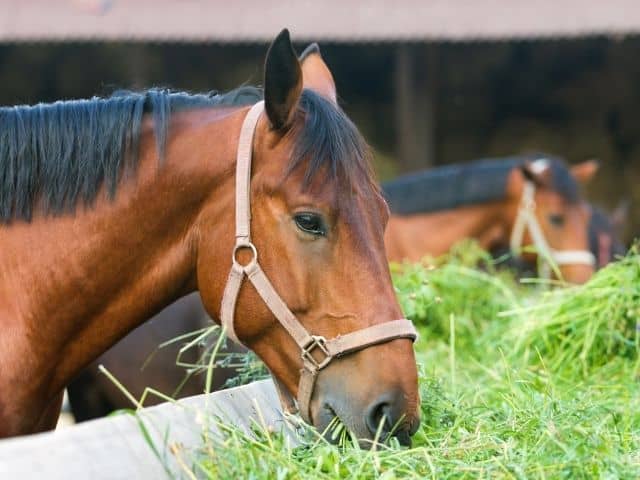
6. Feed according to the horse’s workload, age and body condition
The amount of food (ration weight) and the balance of bulk foods and hard foods should vary according to the horse’s individual requirements. Over-feeding can be as detrimental to a horse’s health and wellbeing as under-feeding. Overfed and underworked horses can be full of energy and bored, which can lead to dangerous behaviour, the development of vices or serious medical conditions. The higher the horse’s energy expenditure, the higher the concentrate level required in the ration. For example, a racehorse in training requires high levels of concentrates, while a horse used only for bush rides on weekends needs very little. Whether a horse is old or young, or lactating, will also impact feed requirements.
7. Do not work the horse immediately before or after feeding
Try to allow one hour of rest either side of feeding. A heavy gut during exercise is uncomfortable for the horse and may cause digestive problems.
8. Ensure a stabled horse receives green feed in its diet
This can be in the form of pasture, clover/meadow hay and lucerne hay or chaff. Green food contains carotene and vitamin A, which are required by horses for normal body cell function and production, disease resistance, preventing nerve degeneration and for satisfactory reproduction and lactation. Carrots and maize also contain these nutrients. Something that must never be fed to a horse is lawn clippings. They generate heat, which may upset the gut, and can contain mould, pesticides, fertilisers, foreign objects or noxious plants. These are all potentially hazardous to horses.
9. Keep to a feeding routine
Horses are creatures of habit and come to expect to be fed at the same time each day. As a result, its digestion patterns will coincide accordingly. Where horses are hand-fed in the stable, paddock or yard, they should be provided with a safe feed bin, tub, trough or bucket for their rations. Placing the feed in a container rather than on the ground reduces wastage, spoilage and trampling of feed and minimises ingestion of sand, bedding and parasites.
Ever considered becoming an Equine Veterinary Nurse?
10. Ensure an adequate supply of fresh, clean water is available to the horse at all times
Water is essential for horses. It prevents dehydration and aids digestion. Water enables food to be moved along the digestive tract and facilitates the uptake of water-soluble nutrients into the body. Water also helps with the horse’s ability to sweat, and therefore maintain body temperature, as well as milk production in mares. Water will be available to horses through their feed; however, they must always have a fresh supply of drinking water to top up as desired. Keep water buckets clean at all times.
11. Treat the horse as an individual
Horses differ in appetite, likes and dislikes and ability to maintain condition – so their diet should be as individual as they are. Keep a note of any changes in the horse’s appetite. Uneaten feed is often the first sign that a horse is feeling unwell. Be sure to monitor uneaten feed or hay. Some snacks that your horse may like include sugar beet and molasses, fruit, vegetables and herbs.
12. Incorporate good feeding with proper dental care and internal parasite control
Proper dental care is important to enable the horse to eat properly. No matter what the quality and balance of the horse’s feed, if the horse has poor teeth or is infected by worms, an adequate diet will be of little or no benefit. Make sure your horse is on parasite prevention and is routinely assessed by an equine dental expert (ideally once or twice a year). The most important point to remember when feeding a horse is to treat them as an individual – there are many different factors to consider, so there is no ‘one size fits all’ formula to determine the correct diet for every horse.
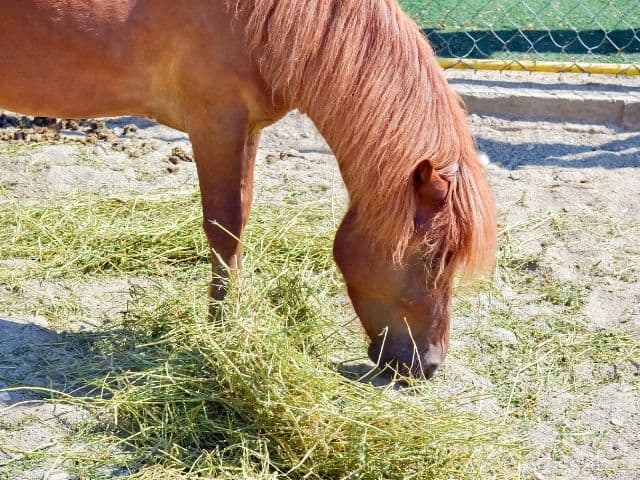
Enjoy creating an individual feeding schedule for your horse!
When creating a feeding schedule for your horse, there’s a lot to understand, particularly how to get the rations right for a horse’s age and workload. Our advice is to get good help and support and consider furthering your knowledge in this area.
Need the confidence to care for horses?
We have two fantastic online options. Our affordable short courses are written by our very own expert Trainers & Assessors and include AVT developed videos and theory to expand your knowledge.
If you are just starting out, our Horse Care Fundamentals Course is the best place to start.
If you are a Qualified Veterinary Nurse and would like the confidence and skills to work in the equine industry? Our Equine Veterinary Nursing Course is the perfect way to obtain foundation knowledge or upskill for your existing duties.
Learn The Basics
Horse Care Fundamentals
About Horse Care Fundamentals
Online Short Course
For Vet Nurses
Equine Veterinary Nursing
About Equine Vet Nursing
